Chapter 15
Evaluating and Accepting an Offer
In This Chapter
◆ The four elements of an offer
◆ Interpreting terms and provisions
◆ Evaluating financing letters
◆ The buyer’s profile
◆ How to accept an offer
Congratulations! You have an offer! It’s a great feeling when a buyer loves your home enough to make an offer. Not only does it validate the way you feel about your home, but there is such a feeling of relief after all the planning and preparation. It’s even more rewarding if you are able to sell in a falling or down market. When you get an offer that is at or near full list price, you obviously have done a good job in pricing it, presenting it, and exposing it to the buyer pool.
While most people think mainly of price, there are actually four important elements to an offer:
◆ The price
◆ The terms (provisions of contract)
◆ The source (quality and profile of buyer)
◆ The presentation
In this chapter, we discuss all four elements. Some of the issues relating to them will be clearly written into the offer and others will not. You and/or your Realtor will evaluate them, and by doing so you will negotiate a stronger deal. You may also save yourself from the stress of having the deal fall apart for certain unforeseen reasons.
Price
From the time that you first decided to sell, you likely had a price in mind that you hoped to get. Now is the moment of truth, when you find out if you’ve gotten it or not. An offer will come in one of three ways: below list price, above list price, or right at the list price. Let’s discuss all three scenarios—how to interpret them as well as how to respond in the best way possible.
Below the List Price
When an offer comes to you below list price, it’s understandable for a seller to feel insulted or to take it personally. Resist the urge to do this. This is a critical point in time for you where you can either engage this buyer in a negotiation or throw a potentially solid contract out the window. It’s possible that this buyer will not budge on his price. Then again, he might come up to an acceptable number. But you will never know unless you—or your Realtor—respond to his offer and engage him in a negotiation.
Now, let’s talk about your approach when this buyer will not budge off his below list price. Again, the natural tendency for many sellers would be to reject the offer. Before you do that, you should be 100 percent sure that the buyer is wrong about the value of your home. The way to be sure is to go back to square one with your Realtor and examine updated (up-to-the-minute) comps to find out what the market has been doing since you first priced it. If your updated analysis shows that this buyer is, in fact, wrong, then perhaps you are correct in rejecting his offer.
But what if he is right about the value of your home, and his low offer is an accurate reflection of the marketplace? This will be disappointing to you and you will likely go through a form of grief. However, think long and hard about rejecting him. If you do, you could be passing up the highest price you will ever receive in this market cycle.
There is a silver lining in this scenario. If the value of your home fell because the market is heading downward, it’s probably going to continue in that direction. Therefore, this number may look good when you look back six months from now.

Seller Alert
Never forget the six- to nine-month rule! A seller cannot truly understand how well he did on the sale of real estate until approximately six to nine months have passed. Just like the stock market, it is impossible to know when the market has hit the bottom—or the top—until the moment is well behind us. Until a seller reflects back on the market conditions at the time of the sale, she cannot make a concrete judgment. At the time, she may have thought that she gave her home away. Yet, six to nine months later, the market may prove that she actually did quite well.
Full-Price Offers
When an offer comes in right at list price, most sellers are thrilled to get what they asked for. This is called a full-price offer. It’s a great feeling and worthy of celebration.
Surprisingly, some sellers reject full-price offers. Perhaps these sellers were only testing the waters in the market to see what price they would get. When they actually got the price they wanted, they doubted themselves and worried that they had undersold it. Sometimes the decision to sell was just not well thought out. The sellers may have had nowhere to go, or they simply realized how much they like the home and wanted to stay in it after all.
Whatever the reason, problems can arise when a seller refuses to sell to a buyer who has met the full list price. The buyer feels duped and that his emotions have been played with because he has fallen in love with something he cannot have. Time, money, and energy have also been spent by attorneys, Realtors, and the seller herself.
If you receive a full-price offer and then change your mind, believing that your home is worth more, you have three ethical choices.
◆ Try to reopen the negotiations. Go back to the buyer who made the offer and ask for more money. However, it is extremely difficult to get a buyer to give you more than what you asked for, particularly if he is not competing against other buyers. Good luck!
◆ Accept the full-price offer. If you do not accept the offer, you are gambling. You are betting on the fact that you are going to make more money with the next buyer, if there is one. If you don’t make more money, you will have rolled the dice and lost.
◆ Raise the list price. Reject the full-price offer and change the list price to a higher number. This approach is unusual and sends a negative message to buyers about the seller’s ability to follow through on an agreement. They’re afraid to get into a deal with a seller who may raise the number again once they make an offer at the new price. The buyers have lost trust and the seller is in danger of losing her credibility.
The point, which we make again and again in this book, is that you, as a seller, should approach the pricing of your home with extreme thought and care. It is essential that you have gone over this number with a fine-tooth comb and that you are truly willing to accept an offer at the number you have chosen.
Above the List Price
This is obviously a terrific situation for any seller. It usually happens when there is more than one buyer competing for your home. This is also known as a multiple bid or, more commonly, a bidding war.
If you have a bidding war on your home, it is crucial that you set up ground rules for all the buyers involved. If you do not, there can be serious consequences. It is your responsibility (along with your Realtor’s) to make sure that the playing field is level for everyone and that the rules are crystal clear. Buyers are cautious by nature. If a buyer suspects that he is not being dealt with in a straightforward and fair manner, he will often walk away from the negotiation and the home itself. Losing a potential buyer in this manner is so unnecessary. To avoid this, take the time to have a lengthy discussion with your Realtor about what the rules will be and how they will be communicated. We have shared what we have experienced to be the best approach to handling bidding wars in Chapter 11.
Terms
A term is a provision in the contract. These provisions may apply to the duties or obligations of the seller and buyer; your rights as well as those of the buyer; and the dates by which responsibilities need to be met, such as forwarding deposit monies and performing inspections.
There will be many terms in the contract. Some of the most important are discussed in the following sections.
If the Buyer Needs to Sell Property Before Buying Yours
Many buyers need to sell and get the money from the sale of one home in order to buy another home. This is often a matter of choreography where two closings happen on the same day. Your buyer will take the money she made on her home and use it to secure the loan to buy your home. Much of the time it works out, but timing is everything.
The potential problem for you, as a seller, is when the buyer makes a written provision in the contract that the purchase of your home is based on (or contingent upon) her selling her property first. This is a dangerous term for you. You should avoid it if you can. When the deal on your buyer’s own home falls apart, your deal will fall apart, too! It’s a domino effect. When one deal goes down in this manner, usually every deal associated with it goes down. If you accept a contingency like this one, you assume the liability of your buyer.
Ask the buyer outright if she needs to sell any real estate in order to buy yours. If the answer is no, that’s great—but have it confirmed in writing that she will close with or without the money from her own home. If you have to accept this contingency because it’s your only option, then proceed with great caution. Ask a lot of questions about the status of the other deal, how far along and how secure it is. Many buyers can also arrange some type of bridge financing—a short-term loan taken out to buy your home that is to be paid back when the buyer sells her own home.
Closing Date
Closing dates are the most common term to be negotiated when accepting an offer. They are usually pretty straightforward. You and the buyer can either coordinate your schedules or you cannot. One way or another, a mutually acceptable date gets negotiated.
The problems arise when something unexpected comes up later on in the deal, well after you’ve signed and accepted the contract. Sometimes the buyer decides that he wants to move in sooner than he’d stated. Or perhaps there is an inspection repair issue, or an environmental or financing issue that delays the closing. But these scenarios usually come as a surprise and cannot be known or negotiated when you receive the offer.

Seller Alert
When you and the buyer sign off on an anticipated closing date in the contract, keep in mind that the exact date does not always have to be met, legally. Contracts often have closing date language that reads like this: “The closing will take place on or around May 5th.” This means that either party can delay it for a short time—perhaps a few days—without violating the contract. In some states, when a number of days have passed beyond the closing date, either the buyer or seller can have an attorney send a “time is of the essence” letter that notifies the other party that they are in danger of violating the contract. Overall, be careful to build in a backup plan for a delayed closing date.
Deposit Monies
Ideally, a down payment on a home should be 20 percent or more. Banks don’t like to loan more than 80 percent of the value of a home. They want to see buyers personally invested in the property and they also want to limit their liability. However, buyers routinely put down less. Some will put down 15 percent, 10 percent, 5 percent, and even less.
Until closing, deposit money is usually held in an escrow account of an attorney or title company, or in the listing Realtor’s agency account. If you or the buyer back out of the deal for a fair reason that is in accordance with one of the provisions in your contract, then the deposit money is returned to the buyer. But if the buyer backs out for reasons that violate the provisions in the contract, then she may lose her deposit money to you.
For example, the buyer can get out of the deal if her financing falls apart and she is unable to secure a loan—assuming that the contract stated the purchase was contingent upon her getting a loan. Most contracts do state this, by the way. (This is why it’s so important to review the preapproval letter from her lender that was attached to the contract. Later in this chapter we discuss how to evaluate preapproval letters.)
On the other hand, if a buyer simply changes her mind about wanting to buy your home after all the contract provisions have been met, then you may be able to keep her deposit money and sell the home to someone else.
Deposit monies usually arrive in three sections and on three different dates.
◆ First deposit: Also known as the earnest money deposit, this comes with the offer itself. Earnest money can be anywhere from a dollar to tens of thousands of dollars.
◆ Second Deposit: Typically comes a few days or weeks into the transaction, depending on how real estate is practiced in your area. It goes into the same escrow account as the first deposit, ideally.
◆ Final Deposit: The last portion of the deposit comes on closing day, along with the loan money from the buyer’s bank.
To calculate the percent that your buyer is putting down, add up all three payments and divide it by the purchase price.

Seller Alert
There are stages in the transaction when a buyer can legally back out of the deal and the deposit money will be refunded. However, sometimes a buyer will back out after she is legally allowed to, according to the contract. In those cases, the seller keeps the first deposit and, if the second deposit was already made, the buyer stands to lose that, too.
Calculating Percent Down on Offer
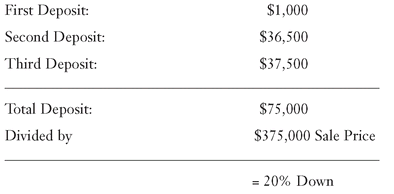
The amount of deposit that the buyer is putting down on your home may not be spelled out in percentage form, but rather in exact dollars. It is important for you and your Realtor to calculate the percentage because the more cash she is putting down, the less of a financial risk she is going to be.
Mortgage Contingency
Most buyers borrow money in the form of a mortgage. When you receive an offer, the buyer will not yet have this mortgage in place. What he should have is a letter from a bank, lending institution, or mortgage broker stating that he has been preapproved for a loan. A copy of this letter should be included with his offer.
Unfortunately, some of these letters are not worth the paper they are printed on. In the years leading up to the subprime crash in 2007 and 2008, it was easy to get a letter even if a buyer was a poor risk. Some say it’s still easy to get one of these letters. In any event, the following sections discuss some tips for how to read between the lines and fact-check letters from lenders.
The Difference Between a Prequalification Letter and a Preapproval Letter
When a buyer contacts a lender to get a letter stating that she is able to get a loan, she receives what’s called a “prequalification” letter or a “preapproval” letter. Too many buyers out there, and even some Realtors, use the term “preapproval” to describe both types.
A prequalification letter can be obtained—via fax—without the buyer ever having met a representative of the bank or lender. She may only have spoken to the representative on the telephone. The buyer gives the lender a Social Security number and a verbal description of her income and assets. The lender will then run a credit check on the buyer to come up with her credit score. Based on this credit check and verbal statement of income and assets, a letter of prequalification can legally be given to the buyer. The letter doesn’t automatically make her a bad risk, but it certainly doesn’t ensure that she is a good risk, either.
A preapproval letter, on the other hand, requires giving the lender actual documents that prove income and assets, such as the previous year’s taxes, employment pay stubs, and original bank statements. In this scenario, the buyer has demonstrated more of a commitment to this lender, and to you, by taking a concrete step in the pursuit of a loan. The documents that she provided cannot be forged and she has given a more complete financial profile to the bank.
The objective, for a seller, is to know what type of letter you are holding in your hand. Surprisingly, many prequalification letters are labeled as preapproval letters. Here are two ways to distinguish between these letters.
◆ Ask, or have your Realtor ask, the buyer if she has provided employment pay stubs, W-2s, last year’s taxes, and bank statements to her lender. Most buyers answer the question without realizing how revealing the answer is. If the answer is no, then perhaps you should not sign the offer until she has done so.
◆ Ask the buyer’s Realtor if you may call the lender directly to verify the information. If she has nothing to hide, she shouldn’t have a problem with this. If she does, that may be a red flag.
When a Buyer Puts Down Mostly Cash
Some buyers put down a huge chunk of money—40 to 80 percent of the purchase price. If your buyer plans to do that, then the loan is a lesser issue and the fact that he really has that kind of cash is the greater issue.
In this case, he should provide an original bank statement showing that he has that much money readily available. If he’d rather not do that, then he should provide a letter from a third party stating that he has the money. It could be a letter from his own accountant, attorney, or bank representative.
When a Buyer Takes the Mortgage Out of the Deal
When a buyer waives the mortgage contingency or “takes the mortgage contingency out of the deal,” she is still borrowing money to buy your home, but she is not making the sale contingent upon her obtaining a mortgage. In other words, she is saying that, even if she is unable to secure a loan, she will still commit to buying your home no matter what. She is trying to show that her finances are strong and that you do not need to worry that she will be a financial risk to you, the seller. However, it’s risky for her, the buyer, to waive the right to back out of the deal because ultimately, she can be required to buy a home that she cannot afford.

Seller Alert
There is one way for the buyer to legally back out of the deal even if she has waived the mortgage contingency, and that is if her Realtor or attorney put a clause in the offer stating that she can withdraw if your home “does not appraise.” If this clause is not there, she cannot back out even if the bank appraiser says that your home is not worth the amount she offered. Technically, she would be required to make up the difference between the sale price and the appraised value out of her own pocket because she waived her rights.
Inspection Contingency
Almost every buyer will perform an inspection of your home. Some buyers may waive the right to perform one, but they are the exception and not the rule.
In some states, the inspection is done before the buyer makes an offer. In other states, it is done after the offer is signed and accepted. If the inspection reveals something that the buyer wants repaired and the seller does not wish to repair it, then the buyer can legally back out of the deal. Quite literally, the purchase is contingent upon the inspection being satisfactory to both parties. If it is not, the buyer can walk away and will have his deposit money returned to him.
However, if his offer is a good one, try to work with this buyer. Perhaps you can negotiate a term or provision in the contract that satisfies you both. Maybe the buyer will agree to only address big-ticket items such as structural problems or environmental issues. These are items that you would have to address with any buyer, so why not do them for this buyer, now? Or maybe you don’t want to make any repairs but will give the buyer a credit at closing—a dollar amount to cover the cost of the repairs.

Seller Alert
Certain environmental and structural issues must be addressed and/or corrected because they are a safety or code violation, or the buyer’s lender requires it as a condition of the loan.
Another type of inspection provision is called an inspection cap. This is where a buyer and seller agree to a maximum dollar amount for repair credits. Sometimes, a buyer will make it an “individual item” cap. She may agree, in the contract, not to address any single repair item valued at less than $500. The buyer is saying, in essence, that she does not want to nickel and dime you on small repair items. She just wants to be sure that she can address major problems with the house, like a leaking roof or cracked foundation.
The Source of the Offer
It is also helpful to know as much about the buyer as possible. Sometimes, you can actually predict how smoothly a real estate transaction will go when you understand someone’s motivation, level of knowledge, and a bit of their history.
If the buyer’s Realtor is good at her job, she will draft and attach a cover letter to the offer with background information on her client. If the following information is not included in the letter, then ask questions. Here are some pertinent ones:
◆ How long has the buyer been looking for a home? If he has just begun his search, he may not be as strong a buyer as you’d like. When a buyer has been looking for a while, he has seen many homes, enough to know when he’s found the right one—and he understands value, too. When a buyer is thoroughly educated to the local real estate market, he will be more confident that he is paying a fair price because he’s been at it for a while. Additionally, the deal is more likely to stay together because he is probably tired of shopping and ready to buy. After a while, buyers get tired of giving up their weekends to home searches. We went further into the buyer thought process in Chapter 10.
◆ Has the buyer recently put an offer in on another home? If so, what happened? It’s amazing how honest and forthcoming a buyer will be when you ask a direct question. If she has put in an offer(s) before, she has demonstrated that she is a motivated buyer and is not afraid to step up to the plate when she finds the right home. On the other hand, maybe she frivolously puts offers on homes that appeal to her but has no intention of following through. Either way, by asking this question, you will learn something about her that could be helpful.
◆ How long has the buyer been at his current job? You shouldn’t necessarily hold it against him for being new to his current job—but it can be quite reassuring to hear that he has been at one job for a decade. It’s probably further proof of his financial stability.
◆ Does she currently rent or own? If she’s a renter, that can be good news because there are no worries about having to sell property first. On the other hand, if her lease is not up for several months, she may not have the same sense of urgency that you do to close.
◆ How long has the Realtor known, or been working with, this buyer? If the Realtor has only been working with the buyer for a very short time, the relationship won’t be as strong as if they’d been working together for a long time. You are depending on his guidance of the buyer as well as the buyer’s trust in the Realtor. If they have a brand-new relationship, the Realtor may not have had enough time to build up the trust needed to guide the buyer and manage the transaction as well as it could be managed. It does not mean that the deal will fall apart, but added to the list of other pertinent questions, you can build a pretty good profile of this buyer and her merits.
The Presentation
The offer should be presented in a legible, clear, and professional manner. It always amazes us when we see purchase contracts come in that are incomplete, confusing, and difficult to read. The following sections discuss the basic elements of a good offer.
Cover Letter
Cover letters are not a legal requirement to making an offer on a home, but they have a positive effect on the presentation. Sometimes, a seller will get two—one from the buyer and one form the buyer’s Realtor. The buyer’s letter will often say something about who he is, where he comes from, and why he wants to buy the home.
The Realtor’s letter will introduce the buyer and will summarize the best points of the offer. These letters also have the effect of putting the seller in a positive mindset before she reads the actual contract.
Here is a sample cover letter from a Realtor:

Dear Mr. and Mrs. Seller:
I represent John and Jane Doe in their offer to purchase your beautiful home. They fell in love with it the moment they stepped inside. It was clear to them that you have put a great deal of care into it over the years. They particularly love the unique architecture and open floor plan.
I have been working with the Does for six months in their search for the perfect home. I have come to know them quite well. They have seen dozens of properties and are very educated about the marketplace. They are also very motivated and qualified buyers.
Their offer is quite strong and is summarized as follows. Details can be found in the attached contract.
◆ Their offering price is $421,000
◆ They plan to put down a 25 percent deposit
◆ They are fully preapproved for a mortgage with XYZ Bank
◆ They have no property to sell in order to purchase yours
◆ They can close whenever you wish
◆ They hope to execute as smooth a transaction as possible
I hope that you will seriously consider their offer.
Regards,
Buyers’ Realtor
As you can see, the main deal points are clearly outlined and Jane and John Doe have made it clear that they are ready, willing, and able buyers.
The Actual Contract
The contract, or purchase offer, is usually about five or six pages long. It outlines the price being offered, the closing date, the amount of the deposits, the amount being borrowed from a lender, the dates by which certain obligations must be met (such as inspections), items included in the sale, environmental and regional laws, and a signature page.
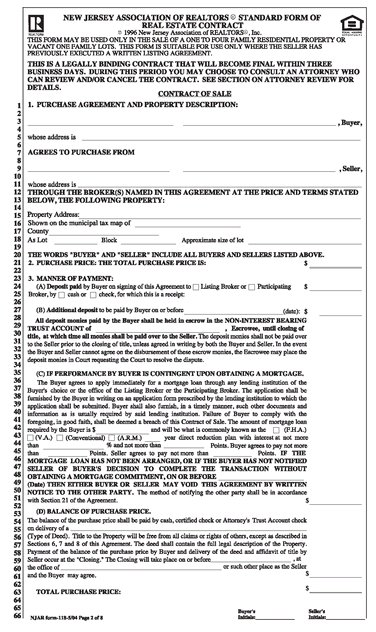

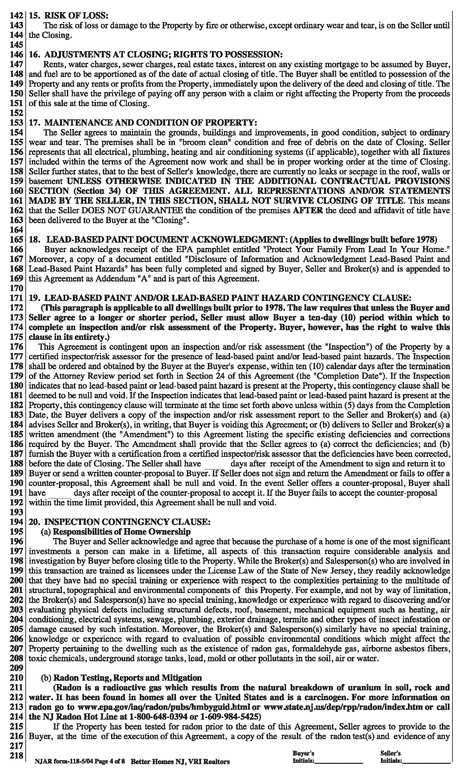
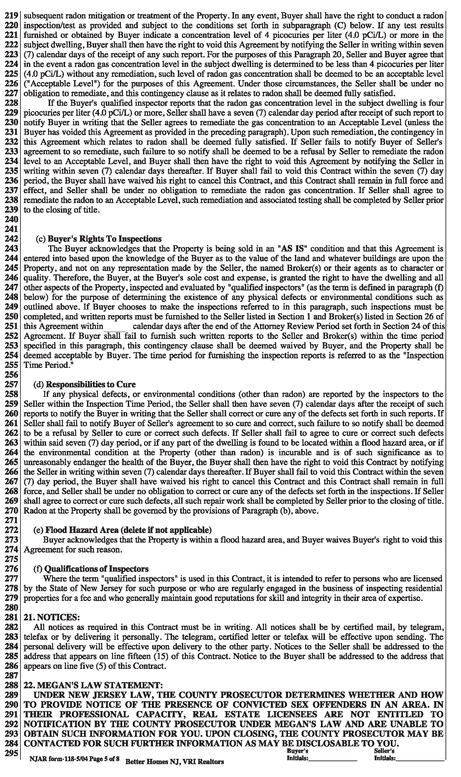
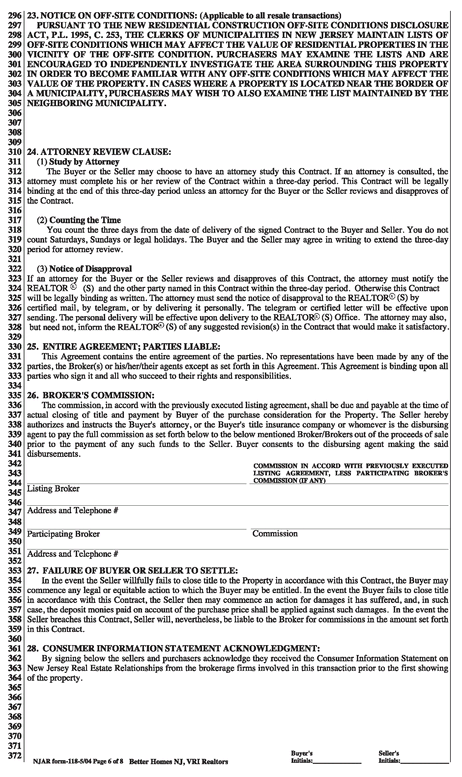
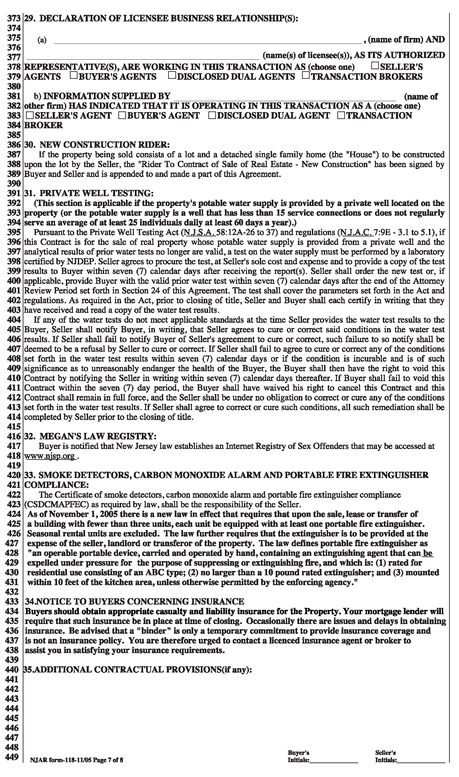
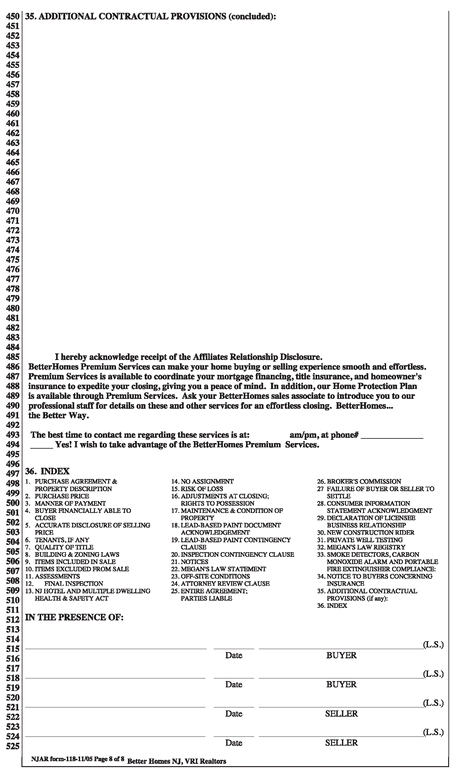
Financing Letter
There should be a letter from a bank, lender, accountant, or financial advisor attached to the offer. This letter should state that the buyer has the funds necessary (either in cash or through a loan) to purchase your home at the price outlined on the contract.
As discussed earlier in this chapter, when the buyer is using a loan to buy your home, note whether he is offering a prequalification letter or a genuine preapproval letter. There is a difference, and the one that the buyer actually presents to you will have an impact on his ability to borrow.
Disclosure Forms
Each state has different requirements for which disclosures a seller must legally provide to a buyer. Some states require a broad seller’s disclosure form, which is essentially a checklist pertaining to every area and system of the home, including electric, plumbing, the foundation and structural integrity, environmental hazards, pests, water leakage, underground tanks, remodeling projects, and more. The seller fills out the form and discloses whether there are any problems in these areas. The buyer then reads it, signs it, and includes it with her offer.
def·i·ni·tion
Dual agency exists when the real estate agency that represents you has also found, brought in, and is representing the buyer. Both buyer and seller must understand its meaning and agree to sell the home through this agency, which is representing both sides of the deal.
Other disclosure forms that may be required in your state are those that pertain to the possible presence of lead in the home, the advisability of using an attorney, and a dual agency form. All of these forms explain the ethics and obligations of those involved—buyer, seller, attorneys, Realtors, agencies, etc.
Copy of Earnest Money Check
It is typical for the buyer’s Realtor to include a check—or a copy of a check—from the buyer showing that he has earnest money to put down right away, in the event that you accept his offer. The check helps to convey his seriousness about following through on the purchase, hence the use of the word “earnest.”
Accepting an Offer
You can accept an offer verbally, and there is such a thing as a legal verbal contract. But, in some states, it is only a written and signed contract that is recognized in a real estate transaction. Once you sign it, you have, in essence, accepted the offer. It doesn’t mean that the deal will make it all the way to closing, but it does formally begin the process.
What to Do After You Have Accepted
Offers, or purchase contracts, presented to you have probably been written up and filled out by a Realtor and then signed by the buyer. If you accept the offer by signing it, the contract should then be forwarded to your representative for review. You are hopefully being represented by an attorney. If you have no representation, then unfortunately you are on your own. We advise against this.
Some states have an attorney review period which often lasts three business days. In that time period, either party—buyer or seller—has the right to change her mind and back out of the contract for any reason … or, for no reason at all. Once this period ends, it is more difficult for the buyer to get out of the agreement without using one of the provisions in the contract, like the inspection or mortgage financing.
When Other Offers Come in After You Have Accepted
This is quite the dilemma for a seller, especially when the new offer is higher than the one that you already signed. If you live in a state that provides a way to easily back out of a signed contract, as in an attorney review period, this scenario can be quite common. We have witnessed it hundreds of times. It can be bumpy and can end badly.
A buyer who would come in and encourage you to break a valid contract with someone else is someone who probably isn’t used to playing by the rules. His motives may be ego-driven. Once he enters into a contract with you and satisfies his need to win, he—quite easily—could decide that he no longer wants your home. When you dropped the first buyer, you likely angered him and will not get him back to the negotiating table. And when the second buyer backs out, you find yourself in the unenviable position of having no buyers at all. If an offer comes in on your home after you have accepted another, think long and hard before you break that first contract.
The Least You Need to Know
◆ Price is not always the most important element of an offer. Consider all the provisions or terms of the contract as well as the overall profile of the buyer.
◆ Do not automatically reject an offer that is below your list price. You may be able to negotiate it up to an acceptable number.
◆ Many buyers need to sell their own homes before they can buy another. Make sure that the buyer’s offer on your home is not contingent upon that sale of her own home.
◆ Don’t confuse a buyer who is fully preapproved for a loan with a buyer who is only prequalified for a loan. A prequalification letter is much less reliable.
◆ Well-presented offers should include a cover letter, finance letter, earnest money check, relevant disclosure forms in your state, and the contract itself.
◆ Proceed with caution when another offer comes in after you’ve accepted one. It could lead to you losing both buyers.
..................Content has been hidden....................
You can't read the all page of ebook, please click here login for view all page.
